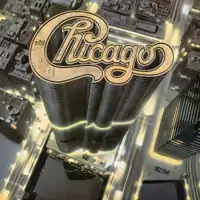Chicago 13
Chicago 13 is the eleventh studio album by the American band Chicago, released in 1979. As the follow-up to Hot Streets, Chicago 13 would be the band's final release that features lead guitarist Donnie Dacus, who had followed late, founding lead guitarist Terry Kath. All band members would contribute to the songwriting (one of only two albums where this is the case, with the other being Chicago VII).
| Chicago 13 | ||||
|---|---|---|---|---|
 | ||||
| Studio album by | ||||
| Released | August 13, 1979 | |||
| Recorded | May - June 1979 | |||
| Studio | Le Studio, Montreal, Quebec; A&M Studios, Hollywood, California; A & R Recording, New York City, New York | |||
| Genre | Rock, disco[1] | |||
| Length | 46:59 | |||
| Label | Columbia | |||
| Producer | Phil Ramone and Chicago | |||
| Chicago chronology | ||||
| ||||
| Review scores | |
|---|---|
| Source | Rating |
| AllMusic | |
| Record Mirror | |
Background
After recording sessions in Morin-Heights, Quebec and Hollywood, Chicago 13—which saw the band return to numbering its albums and displaying its logo—was released that August and was preceded by Donnie Dacus's "Must Have Been Crazy" as lead single. Only peaking at No. 83, Chicago 13 is the first Chicago album to bear no significant hit singles. The opening track, the disco-fueled "Street Player" was also released as a single but it failed to chart, making it the band's first single to miss the charts altogether.
Despite negative reviews, Chicago 13 reached No. 21 and went gold. Although it was the band's first album to miss the Top 20 and was then the lowest charting release since their debut album. Shortly after the tour to support the album ended, Dacus was fired from the band without explanation.
In 2003, Chicago 13 was remastered and reissued by Rhino Records with a B-Side, featuring Dacus's "Closer to You" (an outtake from the Hot Streets sessions), and the 12-inch single mix of "Street Player" as bonus tracks. The songs "Street Player" and "Closer to You" had previously been released by other artists: "Street Player" by Rufus, who originally recorded it before Chicago, and "Closer" by Stephen Stills, though with Donnie Dacus on lead vocals. "Street Player" did eventually reach hit status, being sampled for both the 1995 hit "The Bomb! (These Sounds Fall into My Mind)" by The Bucketheads, the 2009 hit "I Know You Want Me (Calle Ocho)" by Pitbull and the 2013 remix by dance music producer "Tradelove".[4]
Track listing
| No. | Title | Writer(s) | Vocals | Length |
|---|---|---|---|---|
| 1. | "Street Player" | Danny Seraphine/David "Hawk" Wolinski | Peter Cetera | 9:11 |
| 2. | "Mama Take" | Cetera | Cetera | 4:14 |
| 3. | "Must Have Been Crazy" | Donnie Dacus | Dacus | 3:26 |
| 4. | "Window Dreamin'" | Walter Parazaider/Lee Loughnane | Cetera | 4:11 |
| 5. | "Paradise Alley" | Robert Lamm | Dacus | 3:39 |
| No. | Title | Writer(s) | Vocals | Length |
|---|---|---|---|---|
| 6. | "Aloha Mama" | Seraphine/Wolinski | Cetera | 4:11 |
| 7. | "Reruns" | Lamm | Lamm | 4:29 |
| 8. | "Loser with a Broken Heart" | Cetera | Cetera | 4:43 |
| 9. | "Life Is What It Is" | Laudir de Oliveira/Marcos Valle | Cetera | 4:37 |
| 10. | "Run Away" | Pankow | Cetera/Dacus | 4:18 |
| No. | Title | Writer(s) | Vocals | Length |
|---|---|---|---|---|
| 11. | "Closer to You" | Dacus/Stills/Warner Schwebke | Dacus | 4:54 |
| 12. | "Street Player" (Dance mix) | Seraphine/Wolinski | Cetera | 8:44 |
Personnel
Chicago
- Peter Cetera – bass, lead and backing vocals
- Donnie Dacus – guitar, lead and backing vocals
- Laudir de Oliveira – percussion
- Robert Lamm – keyboards, lead and backing vocals
- Lee Loughnane – trumpet, backing vocals
- James Pankow – trombone, brass arrangements
- Walter Parazaider – woodwinds
- Danny Seraphine – drums
Additional personnel
- P.C. Moblee – lead vocals on "Window Dreamin'" and "Aloha Mama" (Moblee was actually Peter Cetera singing in a lower register. His appearance on the album is credited as "courtesy of the Peter Cetera Vocal Company").
- David "Hawk" Wolinski – synthesizer on "Street Player"
- Airto Moreira – percussion on "Street Player", "Paradise Alley", "Life Is What It Is" and "Run Away"
- Maynard Ferguson – trumpet soloist on "Street Player"
Production
- Produced by Phil Ramone and Chicago
- Production Assistant – Michele Slagter
- Engineered and Mixed by Jim Boyer
- Assistant Engineers – John Beverly Jones, Brad Leigh, Peter Lewis, Nick Blagona, Robbie Whelan and Roger Ginsley.
- Mastered by Ted Jensen at Sterling Sound (New York City, NY).
- Cover Design Concept – Tony Lane
- Logo Design – Nick Fasciano
- Back Cover and Sleeve Photography – Gary Heery
Charts
| Chart (1979) | Peak position |
|---|---|
| Australia (Kent Music Report)[5] | 24 |
| United States (Billboard 200)[6] | 21 |
References
- "Chicago brings 'rock with brass' to bear in Sarasota's Van Wezel". Sarasota Herald-Tribune. May 31, 2002. pp. 4 and 8. Retrieved May 25, 2015.
- https://www.allmusic.com/album/r33031/review
- Sexton, Paul (October 13, 1979). "Chicago: Street Player". Vol. 26 no. 41. Record Mirror. p. 16. Cite magazine requires
|magazine=(help) - Beatport, LLC. "Tradelove - Street Player (Club Mix) [LoudBit] :: Beatport". Retrieved February 2, 2015.
- Kent, David (1993). Australian Chart Book 1970–1992 (illustrated ed.). St Ives, N.S.W.: Australian Chart Book. p. 62. ISBN 0-646-11917-6.
- "Billboard 200: Chicago III". Billboard. Retrieved January 21, 2019.